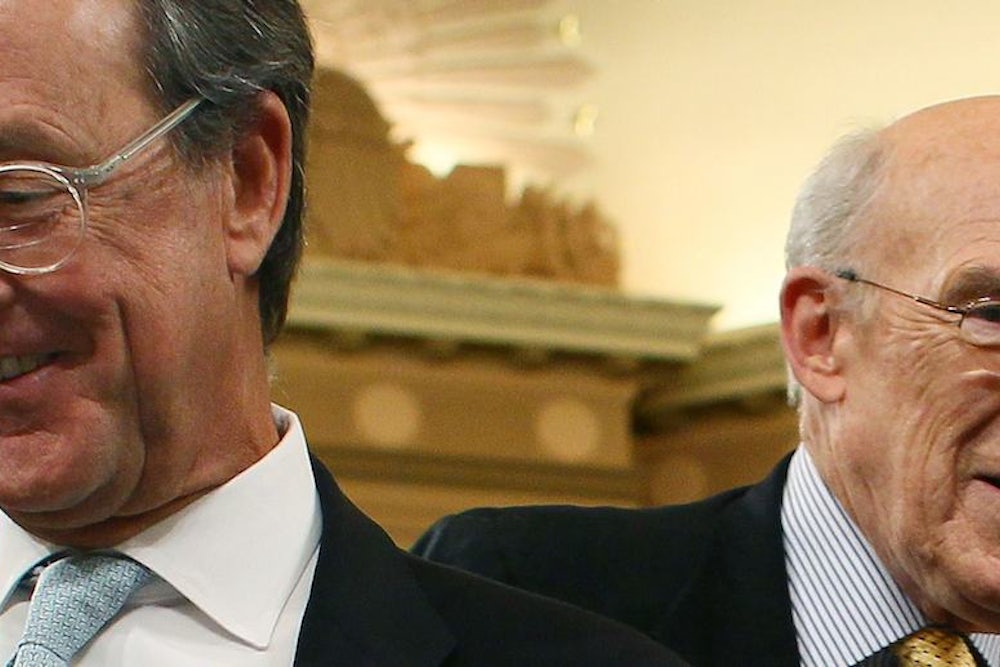They’re back! Barely had Harry Reid and Mitch McConnell announced their agreement to reopen the government and raise the debt ceiling than zooming in from the leaden skies came our old friends, the fiscal hawks.
Fix the Debt, the organization that took flight last year from the very deep pockets of octagenarian Blackstone co-founder Pete Peterson, held an afternoon event at the National Press Club to remind everyone that, crisis averted, the real problem in this country remained our crushing long-term debt. You might think that the fiasco of the past few weeks would have prompted some soul-searching within the organization – after all, its well-broadcast doomsday warnings of a nation drowning in red ink have only helped to feed conservative Republican fury about out of control spending, even as budget deficits steadily decline and the long-term fiscal picture brightens. It is that fury that, as much as anything, drove the brinksmanship over the government shutdown and debt ceiling, but Fix the Debt officials spoke as if they have had no role in bringing us to this point – as if, to the contrary, we arrived at this point precisely because we were not listening to them. Compared to them, the second-guessing Republicans on the Hill Wednesday were models of candor and self-awareness.
One by one, the officials offered the usual above-it-all bipartisan bromides, scrupulously avoiding naming the people or even the party that brought the crisis to a head.
“My hope is that everyone learns the…lesson: that it’s time to govern, to roll up their sleeves and get to work,” said Leon Panetta, the former Defense secretary, CIA director, congressman and Clinton administration chief of staff who was last seen taking not-so-veiled swipes at President Obama and whose deficit hawk credentials have apparently not been undermined by his having spent some $1 million in taxpayer funds on weekly flights home on a military jet to his spread in Monterey, Calif. “The place they should be is in a budget conference….working on the key issues they need to address if we’re serious about reducing the deficit...”
“Most in a bipartisan way can say that fixing the debt has got to be the ultimate goal. Everything else, yeah, we’ll have those fights, we’ll have those disagreements,” chimed in Jim Nussle, a former Republican congressman from Iowa, budget director under President George W. Bush and member of Fix the Debt's steering committee. He offered: “We can give them the tools for that toolbox as they go in to build that consensus.”
“How deeply has our nation sunk into the trenches of partisan politics,” lamented Javier Palomarez, head of the U.S. Hispanic Chamber of Commerce, one of several speakers enlisted by Fix the Debt to buttress its message. “Our Congress has been plagued by divisive politics…Ask Congress to put an end to this hostile era of partisanship and brinksmanship.”
Yes, let’s ask “Congress” to do that. That such rhetoric lives on, zombie-like, is a reminder of how much lies ahead of President Obama and congressional Democrats, even as they relish their victory over Republican hostage-takers. One of the heartening developments during the standoff was the willingness of some Beltway score-keepers to start calling things for what they were, a noted improvement over the reporting of the hostage crisis of July 2011. But Washington’s attachment to outdated notions of cloakroom comity runs deep, and it will take a concerted effort by Obama and congressional Democrats to press their advantage against not only Republicans but the earnest chin-strokers in the establishment who continue to talk as if red ink is the country’s great existential challenge even as unemployment remains stuck above 7 percent and middle-class wages continue their generation-long stagnation.
After the event, I approached Maya MacGuineas, the organization’s highly social executive director, to ask her about the role of the fiscal hawks in helping gin up the anti-spending furor that led to this month’s crisis and whether it had led to any rethinking about the group’s high-decibel warnings. She was undeterred. “It’s still important to ring the bell loud and clear because of the challenge facing the country,” she said. I pressed further, to no avail – MacGuineas cut me off, saying she had to go.*
I got a fuller response from Nussle, who, interestingly, came closer throughout his remarks to dinging his former Republican colleagues than the other Fix the Debt speakers. Yes, he said, deficits were falling, but the organization was from its start focused on the long-term debt, not annual deficits, which “come and go” from year to year. Did that distinction get lost on some people hearing the group’s warnings, who respond by demanding instant, counter-productive spending cuts? Maybe. “It’s a frustration of ours,” he said. “We try to inform people…but it’s been awkward and we haven’t succeeded.”
But then he couldn’t resist falling back on the usual formula: “There’s been a lot of demagoguery on both sides.”
To be sure. And the longer groups like Fix the Debt and other Washington elders keeping talking about the current state of affairs that way, the more likely they are to float into irrelevance, and to see all those well-intentioned plutocratic millions go for naught.
*Correction: This piece initially reported that Maya MacGuineas had given a friendly embrace after the event to Pete Peterson. Peterson's spokeswoman says he was not at the event. The person MacGuineas greeted was someone bearing strong physical resemblance to Mr. Peterson, but not him. The author regrets the error.
